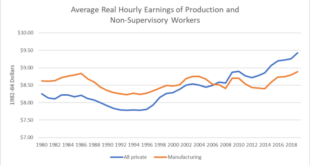from C. P. Chandrasekhar While the world remains preoccupied with the geopolitical and humanitarian fallout of the Russian invasion of Ukraine, its economic consequences are increasingly a matter for concern. Though the two countries at war account for less than two and one half per cent of the world’s population, it emerges that the damage to production within their boundaries and the suspension of their trading relationship with rest of the world threatens a crisis in multiple markets,...
Read More »March 26, 2022
New issue of real-world economics review – 99
Please click here to support this journal and the WEAissue no. 99download whole issue Keynes’, Piketty’s, and an extensive failure index:Introducing maldevelopment indicesJorge Buzaglo and Leo Buzaglo Olofsgård 2 Externalities, public goods, and infectious diseasesSpencer Graves and Douglas Samuelson 25 An essential journey back to the seeds of prosperity in a time of pandemics: Notes for a renewed agenda in development studies Fernando García-Quero and Fernando López...
Read More »Free to trade efficiency?
from Peter Radford Fascinating. The war in Europe is messing with some major preconceptions and exposing some as illusions that, perhaps, we would be better off without. Take, for instance, The Economist magazine’s leader article entitled “Trading with the enemy.” Here’s the key question the article poses: “Is it prudent for open societies to conduct normal economic relations with autocratic ones, such as Russia and China, that abuse human rights, endanger security and grow more...
Read More »World map of billionaires
We don’t need a Cold War with China
from Dean Baker There has been much press around President Biden’s demands that China not support Russia in its invasion of Ukraine. The implication of these demands is that the United States has the ability to punish China economically in a way that imposes more pain on China than on us. That may be true for now, but it’s not clear it will be true much longer, and it may not even prove to be true at present. It is common to refer to China as the world’s second largest economy, after the...
Read More »The irrelevance of the Ramsey growth model
from Lars Syll So in what sense is this “dynamic stochastic general equilibrium” model firmly grounded in the principles of economic theory? I do not want to be misunderstood. Friends have reminded me that much of the effort of “modern macro” goes into the incorporation of important deviations from the Panglossian assumptions that underlie the simplistic application of the Ramsey model to positive macroeconomics. Research focuses on the implications of wage and price stickiness, gaps and...
Read More »Inflation and the War in Europe
Headline as well as ‘core’ consumer price inflation in the EU has increased (graph 1). How to rate these increases? Do we have to jack up interest rates and to restrict spending? Below, I’ll argue that when we try to understand present inflation using a non-neoclassical frame of analyses we do have to take into consideration that: Not all increases are created equalWe should not just look at expenditure prices (consumption, investments) but also at factor prices and cost prices...
Read More »How do we deal with inflation without jeopardising investment in the green transition?
from Yanis Varoufakis . . . While the working classes may rise up 10 years from now to claim the share of aggregate income that they deserve, it is arguable that another 10 years of underinvestment in the green transition will push us all to the brink of, if not extinction, irreparable damage to humanity’s prospects. So how do we deal with inflation without jeopardising investment in the green transition? What is the alternative to a class war in the form of a blunt interest-rate policy...
Read More »As the Fed prepares to raise rates, the inflation hawks are running wild
from Dean Baker With bad news on oil prices, and a new wave of COVID-19 shutdowns in China, the inflation hawks are getting really excited. After all, higher oil prices and further supply disruptions are sure to add to the inflation the economy is already seeing. I guess they were right with their warnings. Okay, let’s get back to Planet Earth. The large stimulus package that President Biden pushed through last year undoubtedly added to inflation in the economy, but it also quickly got...
Read More » Real-World Economics Review
Real-World Economics Review





